
Targeting Donor Aging and Cellular Senescence: Innovations in Regeneration and Transplantation
Local time (Corresponding local time at your current location)
Overview
Dr. Tullius will discuss innovative strategies to rejuvenate and optimize older donor organs, addressing the persistent challenge of organ shortages in transplantation. He will focus on cutting-edge approaches to mitigate ischemia-reperfusion injury, reduce functional decline, and tackle age-related augmented immunogenicity.
The webinar will highlight recent advancements in organ preservation and perfusion technologies, as well as the potential of senotherapeutics to enhance the viability and functionality of older organs. Dr. Tullius will also delve into the interaction between donor and recipient age, exploring the possibility of rejuvenating older organs when transplanted into younger recipients. These novel approaches have the potential to significantly narrow the gap between organ supply and demand, offering transformative solutions for end-stage organ failure.
Dr. LeBrasseur will discuss the groundbreaking advancements in understanding the molecular and cellular damage that accumulates with age, making aging the greatest risk factor for chronic conditions such as cardiovascular disease, Alzheimer’s disease, diabetes, cancer, and lung diseases. This seminar will explore the innovative hypothesis that addressing aging itself could delay or even prevent the onset of age-related diseases and disabilities, thereby extending human healthspan.
A key focus of the webinar will be cellular senescence—a cell fate triggered by various forms of damage—and its role in organ deterioration and dysfunction. Dr. LeBrasseur will highlight compelling evidence from preclinical models demonstrating that genetic and pharmacological elimination of senescent cells can improve the function of multiple organ systems. Additionally, the presentation will feature emerging data from human studies that underscore the potential of senescent cell-targeting therapies as a novel approach to revolutionize health and aging.
Learning Objectives
- Understand role of cellular senescence in aging and disease
- Understand the mechanisms of cellular senescence in aging
- Explore innovative strategies to rejuvenate donor organs and improve transplant outcomes
- Discover cutting-edge therapies targeting aging to enhance tissue regeneration and healthspan.
Supporting MAterials
Iske J, Roesel MJ, Martin F, Schroeter A, Matsunaga T, Maenosono R, Tripathi U, Xiao Y, Nian Y, Caldarone BJ, Vondran FWR, Sage PT, Azuma H, Abdi R, Elkhal A, Pirtskhalava T, Tchkonia T, Kirkland JL, Zhou H, Tullius SG.
Transplanting old organs promotes senescence in young recipients
Am J Transplant. 2024 Mar;24(3):391-405.
doi: 10.1016/j.ajt.2023.10.013. Epub 2023 Oct 31.
Cummings SR, Lui LY, Zaira A, Mau T, Fielding RA, Atkinson EJ, Patel S, LeBrasseur N.
Biomarkers of cellular senescence and major health outcomes in older adults
Geroscience. 2024 Dec 18. doi: 10.1007/s11357-024-01474-9. Epub ahead of print.
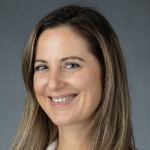
Alice Tomei, USA
Moderator
Bio
Miami Engineering Career Development Associate Professor
Department of Biomedical Engineering
University of Miami, USA
Dr. Tomei is the Miami Engineering Career Development Associate Professor in Biomedical Engineering at the University of Miami. She obtained her M.S. in Materials Engineering from the Politecnico of Milan (Italy) in 2004, and her Ph.D. in Bioengineering and Biotechnology from the Ecole Polytechnique Fédérale de Lausanne (EPFL, Switzerland) in 2008. Dr. Tomei currently directs the Islet Immunoengineering Lab at the Diabetes Research Institute (DRI) where she is applying her unique background in bioengineering and immunology to develop novel immunoengineering platforms to prevent rejection after islet transplantation and to promote antigen-specific tolerance for a cure of type-1 diabetes.
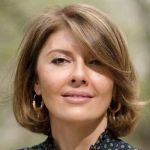
Ekaterine Berishvili, Switzerland
Moderator
Bio
Head of the Laboratory of Tissue Engineering and Organ Regeneration
University of Geneva
Technical Director of the Cell Isolation and Transplantation Center
University of Geneva Hospitals, Switzerland
Dr. Ekaterine Berishvili is the Technical Director at the Cell Isolation and Transplantation Center, Department of Surgery, University of Geneva Hospitals. She also leads the Laboratory of Tissue Engineering and Organ Regeneration at the University of Geneva. Her expertise is focused on cell-based therapies for type 1 diabetes, immune tolerance induction, and the bioengineering of the endocrine pancreas. She holds positions on the board of the ESOT and CTRMS. Dr. Berishvili is an active member of several scientific committees, including Breakthrough T1D beta cell replacement consortium, and serves on the editorial board of Transplant International as an associate editor. At the national level, Dr. Berishvili is a member of the Swiss Transplant Cohort Study’s scientific committee. She represents Geneva in the Swisstransplant working group specializing in pancreas, islet, and small bowel transplantation.
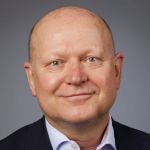
Stefan G. Tullius, USA
Speaker
Bio
The Joseph E. Murray, MD Chair in Transplant Surgery, Brigham & Women’s Hospital, Boston
and Professor of Surgery, Harvard Medical School.
Stefan G. Tullius, MD, PhD is the Joseph E. Murray, MD Chair in Transplant Surgery at Brigham & Women’s Hospital, Boston and Professor of Surgery at Harvard Medical School. He has served as Vice President of The Transplantation Society (TTS), Sr. Treasurer for TTS, and is currently Vice President of the Int’l Society of Uterus Transplantation. He also serves as Editor-in-Chief of the Transplantation journals (Transplantation and Transplantation-Direct). In addition to his clinical role as program director for Transplant Surgery, he leads a productive NIH-funded research laboratory and lists > 340 PubMed listed scientific manuscripts in addition to numerous book chapters. He serves and has served on the Board of several academic societies including ESOT, TTS, UNOS, and the National Kidney Registry. His work has been recognized with many awards in addition to memberships in the American Surgical Association and an honorary membership in the French Academy of Medicine.
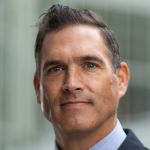
Nathan LeBrasseur, USA
Speaker
Bio
Professor, Department of Physical Medicine and Rehabilitation,
Department of Physiology and Biomedical Engineering, Mayo Clinic
Director, Robert and Arlene Kogod Center on Aging
Co-Director, Paul F. Glenn Center for Biology of Aging Research,Mayo Clinic
Chair, NIH Cellular Mechanisms in Aging and Development Study Section.
Nathan LeBrasseur, PT, PhD, is a Professor in the Department of Physical Medicine and Rehabilitation and has a joint appointment in the Department of Physiology and Biomedical Engineering at Mayo Clinic. Dr. LeBrasseur is the Director of the Robert and Arlene Kogod Center on Aging and the Co-Director of the Paul F. Glenn Center for Biology of Aging Research at Mayo Clinic. He is the recent chair of the NIH Cellular Mechanisms in Aging and Development Study Section. Dr. LeBrasseur’s research team conducts translational “bench-to-bedside” research on strategies to improve physical function, metabolism, and resilience in the face of aging and disease. His latest work has centered on cellular senescence, a fundamental mechanism of aging, and interventions to counter this process to extend healthspan. Dr. LeBrasseur has received the Glenn Award for Research in Biological Mechanisms of Aging, the Nathan W. Shock Award Lecture from the National Institute on Aging, and the Vincent Cristofalo Rising Star Award in Aging Research from the American Federation for Aging Research. He is a Fellow of the Gerontological Society of America.
Use the image below to promote this event (right-click to download)
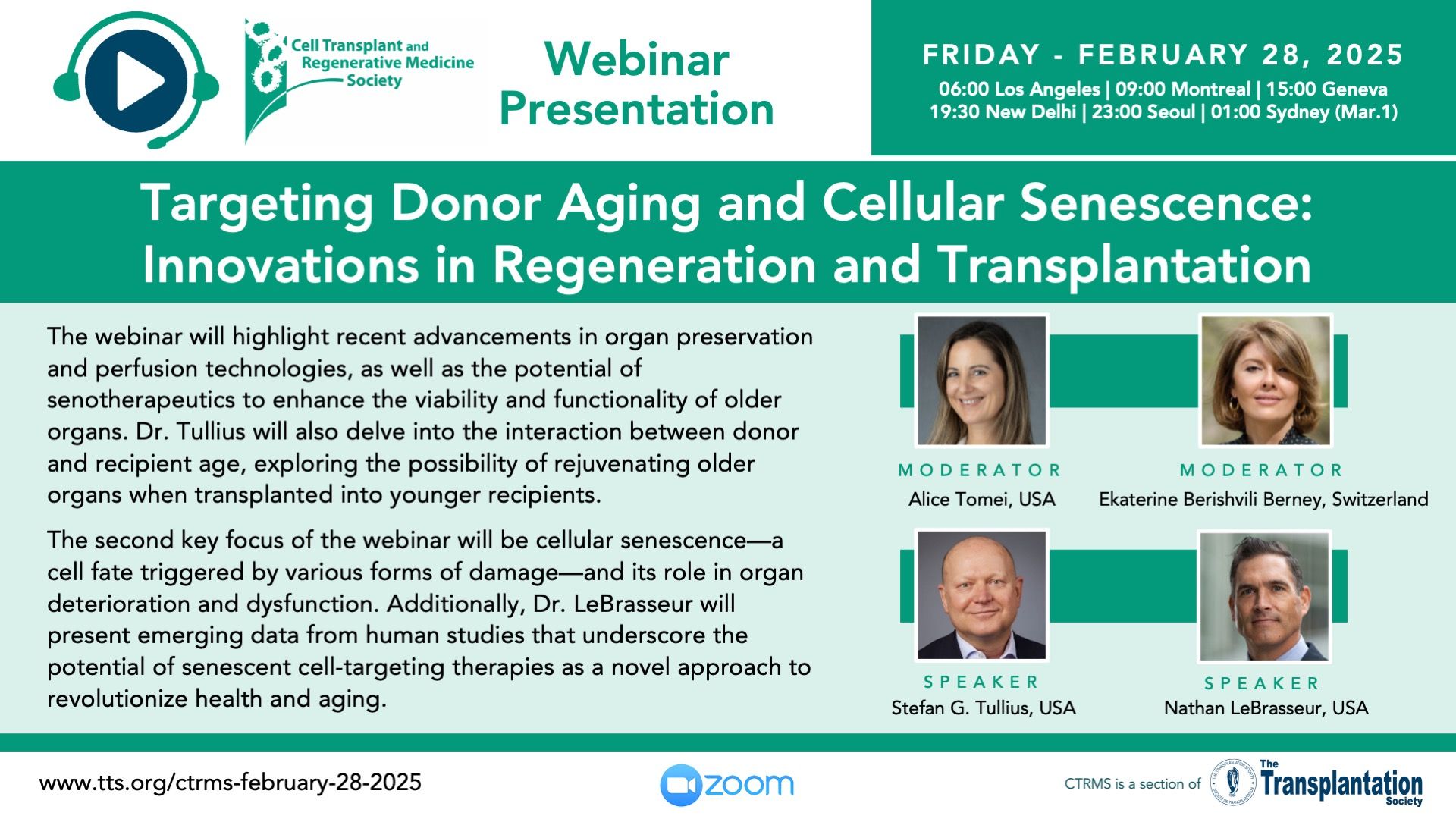
Contact
Address
The Transplantation Society
International Headquarters
740 Notre-Dame Ouest
Suite 1245
Montréal, QC, H3C 3X6
Canada
Используйте Вавада казино для игры с бонусом — активируйте промокод и начните выигрывать уже сегодня!
